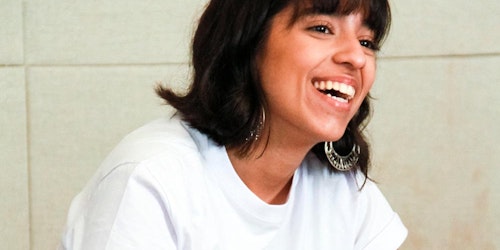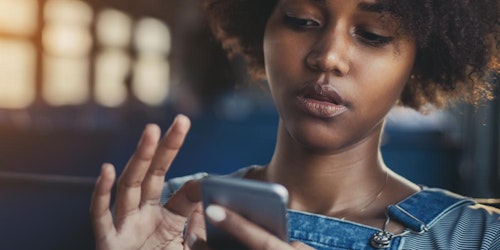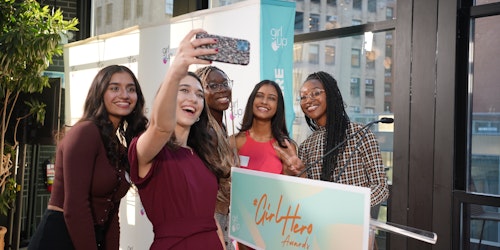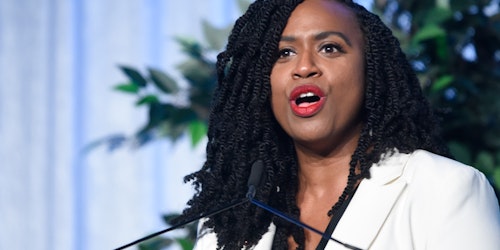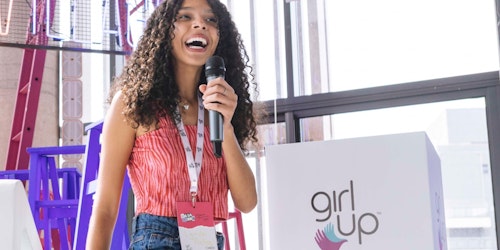Estimated reading time: 7 minutes
Trigger Warning: Mentions of harassment and child sexual abuse
Every June, people commemorate Pride Month worldwide: A time to celebrate the progress made by sexual and gender minorities rights movements and acknowledge the ongoing struggles the community faces. This month, venturing across the border, Girl Up India had the privilege of engaging in an insightful conversation with Pakistani activist and social entrepreneur – Saro Imran. This interview captures how her experience as a transgender woman in Pakistan led her to build a life free of economic barriers for all girls and women and the importance of championing the voices of sexual and gender minorities all year round.
Can you take us back to what got you started on your leadership journey?
Being a trans kid in Pakistan was not easy. There was constant bullying, discrimination, and harassment, and I was a victim of child sexual abuse. Moreover, there was no safe space or anyone to share my experiences with. The worst incident occurred when I was around 15 or 16, and I became the victim of a mob attack. They used physical violence as a form of conversion therapy, intending to ‘correct’ me. I was badly injured and spent two long years in trauma, confined to a dark room, unable to feel anything – no happiness, or sadness. Ultimately, I promised myself that I would not remain a victim or merely a survivor but become a fighter for my rights and justice, as well as for other transgender persons who cannot raise their voices. This determination led me to start working as a volunteer with a local organization, and that’s how my leadership journey began.
I promised myself that I would not remain a victim or merely a survivor but become a fighter for my rights and justice, as well as for other transgender persons who cannot raise their voices.
Can you tell us more about the vision and mission of the Pink Center?
First of all, I completed my master’s in philosophy and business management, specializing in entrepreneurship and my thesis delved into the challenges and opportunities faced by Pakistani entrepreneurs. Moreover, since I started working in 2013, I have become acutely aware of the prevalent human rights violations against transgender individuals, particularly transgender women, in my country and how they often stem from their financial dependence on potential abusers, be it partners, family, or friends. While strides have been made in advocating for social rights, economic justice for transgender women remains a neglected domain, especially in regions like the Global South, including Pakistan.
In 2020, I came up with the idea of establishing a platform dedicated to promoting the economic empowerment of transgender women, and Pink Center was born. This initiative aims to not only provide them with financial freedom but also to equip them with the tools necessary for sustainable socio-economic development. By leveraging entrepreneurship as a catalyst, we seek to foster their capacity to contribute meaningfully to both national and global economies, aligning with Sustainable Development Goals.

In a world that’s often so cruel to queer, specifically trans people, how can we build spaces that can champion the voices of sexual and gender minorities?
One significant issue is the exclusion of a majority of transgender individuals, mainly due to accessibility barriers such as language differences. It’s essential to recognize that countries like India, Pakistan, Bangladesh, and Nepal are more than just their capital cities; they encompass diverse geographical regions. However, we often overlook this fact, assuming that reaching Islamabad means reaching the entirety of Pakistan. The reality is that a significant portion of the population resides outside metropolitan areas.
Geographical justice is crucial in ensuring that resources and support reach marginalized communities effectively. Currently, the bulk of resources from donors are concentrated in major cities like Lahore, Karachi, and Islamabad, leaving out the majority of transgender individuals living in non-metropolitan regions. To address this disparity, there must be a concerted effort to integrate grassroots communities by taking small steps like recognizing that English shouldn’t be the sole medium of communication.
By enhancing the skills and capabilities of individuals, particularly those in marginalized groups, we can ensure a more equitable distribution of resources and opportunities.
Capacity building is another vital aspect of empowering communities. By enhancing the skills and capabilities of individuals, particularly those in marginalized groups, we can ensure a more equitable distribution of resources and opportunities. Also, fostering knowledge exchange and learning between countries is important for effecting global change. By adopting a win-win approach and working together across borders, we can drive long-term positive transformations on a global scale.
Data suggests that between 2013-2017, Sexual and Gender Minorities movements worldwide received $1.2 billion, while the anti-gender movement received $3.7 billion. In such a context, what strategies can we employ to strengthen the rights of women and sexual and gender minorities?
Firstly, it’s important to note that the anti-gender movements don’t rely solely on international funding. They often draw support from local resources, leveraging cultural and religious sentiments to oppose progressive policies. For example, Pakistan passed the Transgender Persons (Protection of Rights), Act in 2018, a significant step towards recognizing transgender individuals based on self-perceived gender identity. However, right-wing political parties challenged this law in the country’s highest Islamic court, claiming it goes against cultural and religious values. They received substantial funding and spread propaganda against the law, leading to a significant backlash.
Community-based groups, especially those led by transgender individuals, face hurdles in registering and accessing donor funds due to strict protocols and documentation requirements. To address these issues, there’s a crucial need for capacity-building and resource mobilization strategies within the transgender, queer, and feminist movements. Integrating transgender rights within the broader feminist movement has shown promise, with many feminist organizations and activists offering support.
Despite ongoing struggles, there have been positive developments in Pakistan, such as the integration of transgender individuals into the police force as victim support officers and the establishment of job portals for transgender people. Ultimately, achieving meaningful change requires a multifaceted approach involving community empowerment, societal shifts, and proactive measures from public and private entities. It’s a collective endeavor to promote inclusion, equal rights, and justice for transgender individuals and marginalized communities as a whole.
It’s a collective endeavor to promote inclusion, equal rights, and justice for transgender individuals and marginalized communities as a whole.
If you could think of an ideal world, what does that world look like for you?
My ideal world would be one where every transgender individual is granted equal rights and unfettered access to justice, alongside the equitable distribution of social rights and financial resources. Currently, there’s a concerning trend of dependency on grants and NGOs for sustenance. To counter this, sustainable models must be developed to foster community self-sufficiency beyond the scope of short-term projects. Genuine empowerment shouldn’t rely solely on donor funding; rather, it should serve as a catalyst for communities to autonomously assert their rights, pursue justice, and achieve sustainable socio-economic progress. This shift towards sustainable empowerment ensures that transgender individuals are not only recipients of aid but active participants in shaping their futures, independent of external assistance.

This Pride Month, what message would you like to send to young queer and trans kids out there navigating their identities and their place in this world?
It requires immense courage and inner strength to navigate the journey of discovering one’s identity. To all young individuals, especially those who identify as transgender, I urge you not to feel guilty about your gender identity; instead, wear it as a badge of honor.
Meaningful and sustainable change always originates from the grassroots level. It’s about taking small, incremental steps rather than expecting overnight transformations. Initiating change within your immediate surroundings—be it your home, classrooms, neighborhoods, or workplaces—is where the process begins. These micro-level changes, although gradual, have the power to catalyze broader societal shifts, eventually influencing national and global landscapes.
It requires immense courage and inner strength to navigate the journey of discovering one’s identity. To all young individuals, especially those who identify as transgender, I urge you not to feel guilty about your gender identity; instead, wear it as a badge of honor.
So, don’t underestimate the impact of your actions within your personal sphere. By fostering acceptance and understanding within your immediate environment, you’re laying the groundwork for larger-scale change. Remember, every step, regardless of how small, contributes to the greater journey towards equality and inclusivity for all.
This interview has been edited for length and clarity.
Follow Girl Up India for more conversations on global feminist issues with the world’s most influential changemakers as a part of our ongoing series “Feminists Across Borders” on Instagram.



